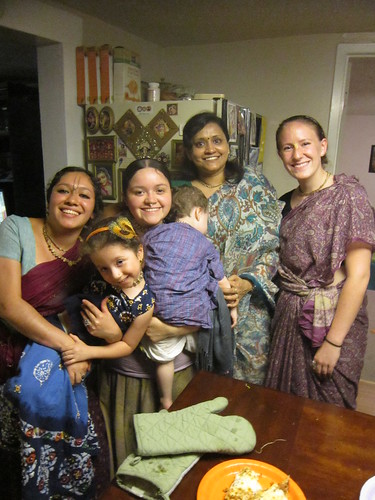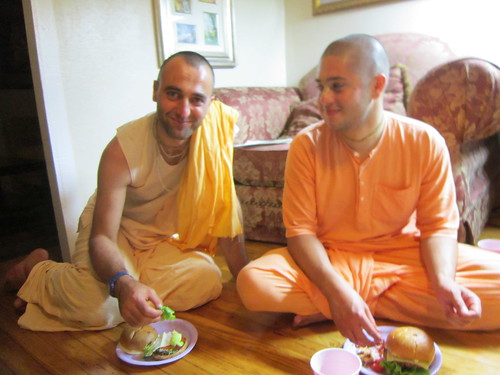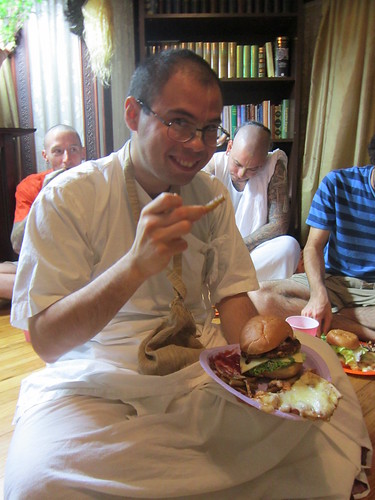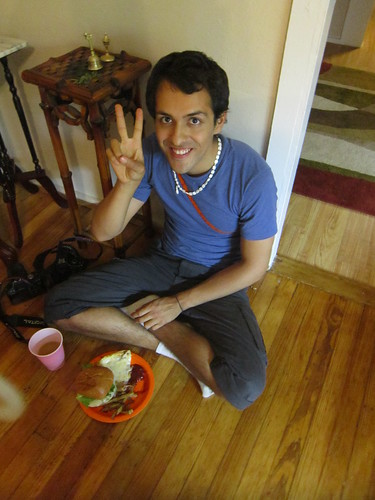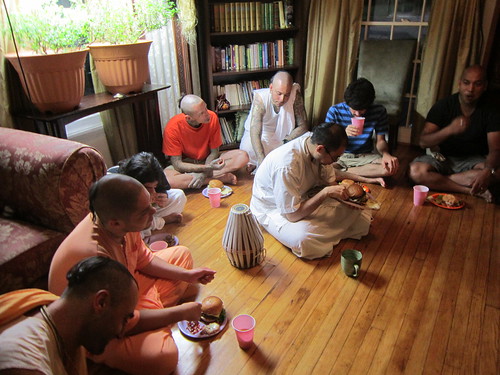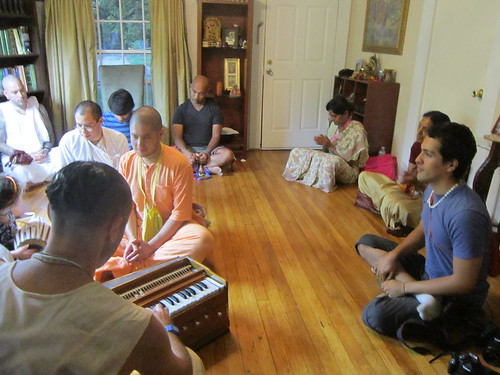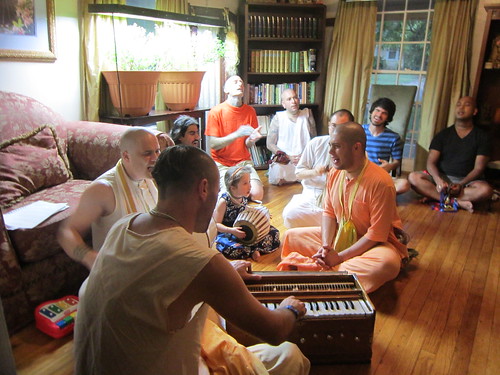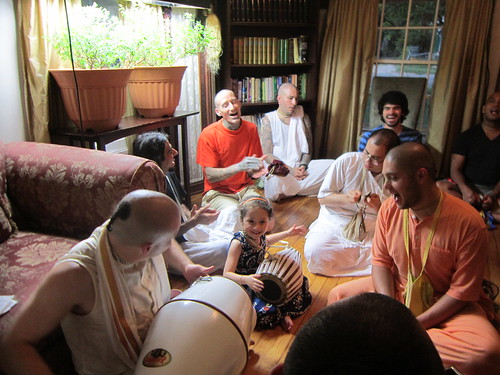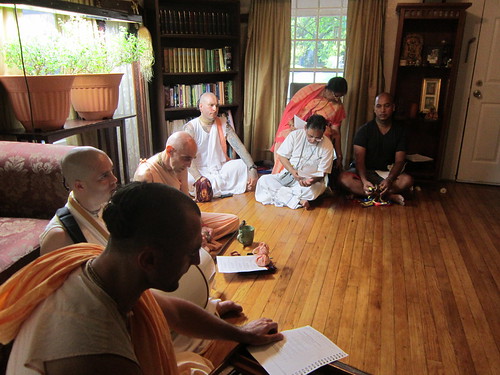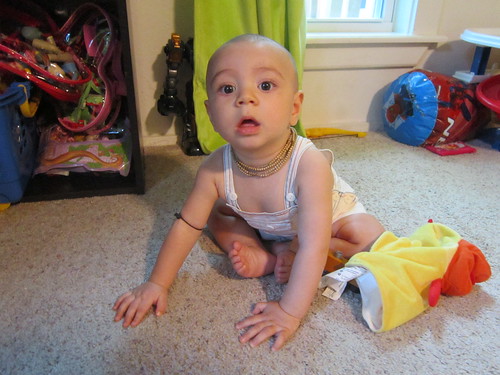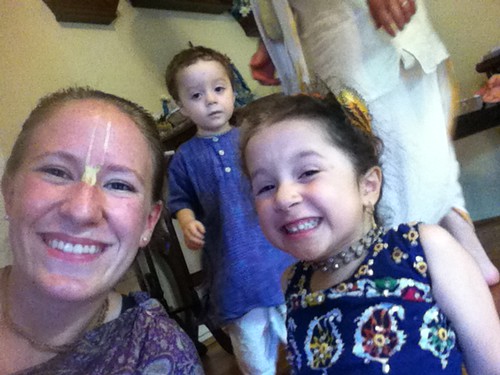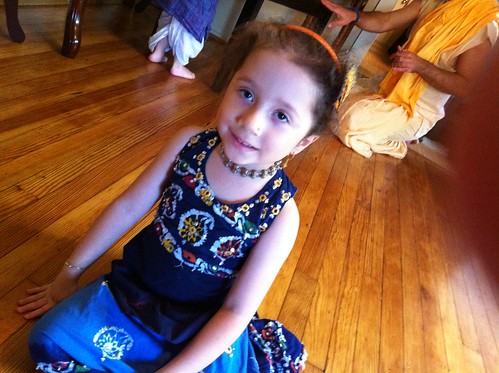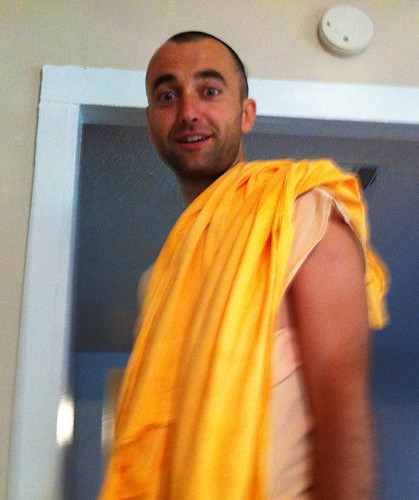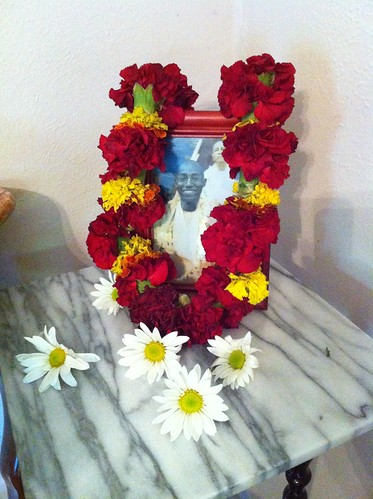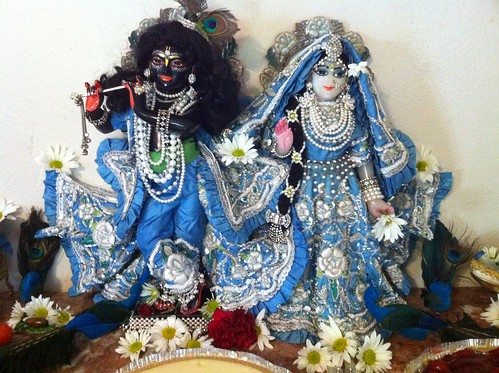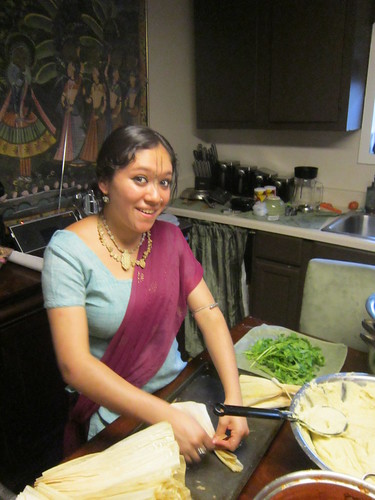Anyone who is a devotee of Krishna must hear this, it is really amazing
Saturday, June 30, 2012
Friday, June 29, 2012
HH Bhakti Tirtha Swami’s disappearance day program
We had a nice program at our home with His Holiness Hanumat Presaka Swami and disciples of His Holiness Bhakti Tirtha Swami and well wishers. On the audio recording you can hear nice talks from HH Hanumat Presaka Swami, Advaita Acharya Prabhu, Baladeva Vidyabhusana Prabhu, Devahuti Mataji, and others all in under 50mins.
<
Earlier that week my wife had heard a quote from HH Bhakti Tirtha Swami where in he said, “devotees are bringing me this wheatgrass juice, but I want to know, where is the pizza, the French fries, the veggie burgers, where is the cheese cake, and where is the ice cream. So she decided to make all those items with the help of Bhuvana Mohini who also made tamales and Mexican pizza as well.
Tuesday, June 26, 2012
TEXAS FAITH 74: What are you reading this summer? And why?

Dallas Morning News,
Each week we will post a question to a panel of about two dozen clergy, laity and theologians, all of whom are based in Texas or are from Texas. They will chime in with their responses to the question of the week. And you, readers, will be able to respond to their answers through the comment box.
Let’s take a break from the world of religious surveys, topical headlines and public policy and do something different this week. And that is share with Texas Faith followers what you are reading this summer and why you are reading it.
For a number of reasons, summer is known as a time of reading. That could be because of so many summer books coming out. It could be that we all have more time to read on vacation. Or it could be that summer is less stressful.
Whatever the reason, here is the question for this week:
What are you reading this summer? And why?
Your answers will help inform our readers about your cast of mind — and the topics that you consider important.
NITYANANDA CHANDRA DAS, minister of ISKCON (International Society for Krishna Consciousness), Dallas
This summer I will be reading the Śrīmad-Bhāgavatam. This book is very significant as it deals not only with how great God is, but it also goes into volumes of detail about how sweet God is. The personal character of God, the attributes of God, the various forms and body of God, and even the activities of God are elaborated in this ancient manuscript.
How can someone love another person about whom they have no knowledge? One can have gratitude for an unknown benefactor but real personal love requires attachment to personal details.
“Wait a minute! Are you saying that God is a real person?” “Yes! For would it be logical to conclude that the sun is cold after experiencing the heat of its rays? So similarly would it be logical to conclude that our source lacks form and personality?”
The Śrīmad-Bhāgavatam reveals the sweetness of God, Krishna, only after extensively dealing with the subject of how God and His energies interact with this material realm. These details are so extensive that scientists become baffled. It is pure in its purpose, for you will not find the goals of material benefits or even salvation put forward in this sacred literature. The goal in the Śrīmad-Bhāgavatam is simply to reawaken our natural dormant love and mood of service towards God. The goal is not to gain wealth or to secure a position in Heaven or to gain anything from God, but rather to be in the mood of giving to God, the mood of love.
Friday, June 15, 2012
TEXAS FAITH 73: Is knowing a fetus' entire genome taking medical knowledge too far?

Dallas Morning News,
Each week we will post a question to a panel of about two dozen clergy, laity and theologians, all of whom are based in Texas or are from Texas. They will chime in with their responses to the question of the week. And you, readers, will be able to respond to their answers through the comment box.
How much information is enough?
The New York Times reported last week that researchers have discovered that performing simple tests on parents can lead to an understanding of almost the entire genome of a fetus. By taking a blood sample from a pregnant woman and a saliva specimen from the father, experts can let parents know virtually all the DNA of a child before it is born.
As the Times reported, thousands of genetic diseases could be detected. In the not-so-distant future, parents could pay an affordable price to get that information, too.
But this breakthrough also raises complicated ethical issues. On the one hand, parents could be more ready for the challenges that await them. Yet will this lead to more abortions, including of children whose parents don't like the DNA profile?
Undoubtedly, we all like information. But you could argue the creation story in Genesis shows the risks that come in acquiring knowledge.
Is this one of those instances? Is this discovery taking medical knowledge too far?
NITYANANDA CHANDRA DAS, minister of ISKCON (International Society for Krishna Consciousness), Dallas
In Vedic culture knowledge that had the potential to be harmful was privileged to those who had the moral character to use it properly. "Ignorance is dangerous but misguided knowledge is the most dangerous" Śrī Īśopaniṣad 9. But here the basic problem is that people are ignorant of the laws of God and the laws of nature.
Whatever genetic profile the child may get is really a result of karma from his or her previous lives, and whatever child the couple may receive is also due to the karma from the parents' previous lives.
It is better to accept one's karma than to try to deal with it unlawfully, in such a manner as abortion. To kill a child within the womb or outside the womb is against the laws of God. By accepting the child that was given to the parents by God's arrangement the couple decreases their karma. By killing the child their suffering only doubles. They will not be able to escape the karma that caused them to have that particular child, and in that case they will also have to accept the karma of killing an innocent child.
It is by the superior order of God that a particular soul is directed to take birth from a particular mother and father. If we try to interfere it is both unlawful and punishable by the laws of nature.
Therefore, in regard to this question, the main issue is that information should not be used to transgress the laws of nature and the laws of God.
On a side note, in the Vedic culture, contrary to materialistic calculations, it was accepted that sometimes being born in a handicapped body was a blessing. Because such a soul, instead of being allured to enjoy this material world and missing the goal of life, could have less of a drive for false temporary happiness and a better drive to seek out and experience life's purpose, to develop one's loving relationship with God.
Tuesday, June 12, 2012
TEXAS FAITH 72: How can the media better cover religion?

Dallas Morning News,
Each week we will post a question to a panel of about two dozen clergy, laity and theologians, all of whom are based in Texas or are from Texas. They will chime in with their responses to the question of the week. And you, readers, will be able to respond to their answers through the comment box.
Is the media's coverage of religion too sensationalized?
Most of the public thinks so, according to a survey released this spring by the Knight Program in Media and Religion at USC's Annenberg School of Communication and the University of Akron's Roy C. Bliss Institute of Applied Politics. The poll found that two-thirds of respondents think that religion coverage is too sensationalized. By contrast, only a third of reporters see it that way.
This week's question may seem like I'm a bit of a masochist. But actually it is an important one for journalists to think through as we deal with matters of faith.
I was struck by the finding in the survey that a quarter of respondents are "very interested" in coverage about religion. But they want more textured and nuanced reporting. For example, they are interested in understanding spiritual practices as well as how faith impacts lives.
I was also struck by this finding, as USC's Diane Winston put it: A majority of both the public and reporters agree the news media "does a poor job of explaining religion in society," with 57.1 percent and 51.8 percent agreeing, respectively.
So, here's my question for this week:
How do you think the media could better explain the role of religion in society?
The answer is important for both consumers of news and those who report the news and interpret it.
NITYANANDA CHANDRA DAS, minister of ISKCON (International Society for Krishna Consciousness), Dallas
 Informants need to be educated. Spiritual life is not a trip to the zoo in which your peer in through iron bars. Rather, it is something that is meant to be intellectually understood and experiential by practice.
Informants need to be educated. Spiritual life is not a trip to the zoo in which your peer in through iron bars. Rather, it is something that is meant to be intellectually understood and experiential by practice.
It is not for the blind believers nor blind doubters. It is something that is intelligent, consistent, and practical.
Those who work for news agencies can better perform their work if they are privy to all the nuances of the various cultures. Ministers and pastors also can better inform the public if their presentation is logical, consistent, and proven true by the good personal character of the practitioner.
In the Vedic culture the guru principle is emphasized for this purpose. The guru is not only someone who is expert in the subject but also someone whose life and character is an emblem of the spiritual teachings.
The problem is that even though spirituality is even more sophisticated than medical science, the general public thinks that spirituality can be understood simply by reading a book. In contrast to this society understands that medical science can be only be understood by going to medical school and studying those books under the tutelage of a medical guru.
Wednesday, June 6, 2012
TEXAS FAITH 71: Is religious freedom under attack in America?

Dallas Morning News,
Each week we will post a question to a panel of about two dozen clergy, laity and theologians, all of whom are based in Texas or are from Texas. They will chime in with their responses to the question of the week. And you, readers, will be able to respond to their answers through the comment box.
Is religious freedom under attack in America? If you think so, please explain your reasons.
If you think not, please explain your thoughts.
Some Catholic institutions certainly contend religious freedom is under attack.
Last week, 43 Catholic organizations, including the University of Notre Dame and the dioceses of Dallas and Fort Worth, filed suits in federal courts protesting the Obama administration's requirement that employers provide workers free birth control.
The original mandate exempted houses of worship, but did include religiously-affiliated organizations and charities. After receiving complaints about their inclusion, the White House offered a compromise that would require insurers to pay for the coverage of workers in such organizations.
But the leaders of those 43 Catholic institutions believe they still face questions of religious freedom. "Our valuable ministries and fundamental rights hang in the balance," New York Cardinal Timothy Dolan said in explaining the lawsuits.
Catholic organizations aren't the only religious institutions that are questioning whether religious freedoms are being restricted in America.
Students at Vanderbilt University are protesting a decision by the school to require religious groups to allow people who don't share their beliefs to run for office in their organizations.
A March poll by Public Religion Institute showed that 61 percent of white evangelical Protestants contend religious liberty is under attack.
And the roiling debate over the sanctioning of same-sex marriages has raised questions in some traditions about whether their religious liberties are being challenged.
Of course, not all Americans think their religious freedoms are under attack. The Public Religion Institute's poll found that 56 percent of respondents felt religious freedoms were not being threatened.
So, where are you on this issue?
NITYANANDA CHANDRA DAS, minister of ISKCON (International Society for Krishna Consciousness), Dallas
Although America is a misguided country, ever guided towards materialism, there is freedom of religion in most cases.
I can state this because although the Vedic tradition is over 5,000 years old and its prevalent practice in America has been around for only 40 or so years, the rights of such practitioners have been mostly upheld and not obstructed.
Tuesday, June 5, 2012
Videos from the Sadhu Sanga Festival
HH Indradyumna Swami Kirtan at the Sadhu Sanga Festival and dancing by HH Giriraj Swami
Initiation of Sadhu Sanga Das by HH Indradyumna Swami and talk by HH Giriraj Swami (someone kept calling so the video was cut at some intervals)
Wimberly Texas, the site of the Sadhu Sanga Retreat. The bridge to the hotel was a waterfall. Many beautiful scenes in Wimberly.
